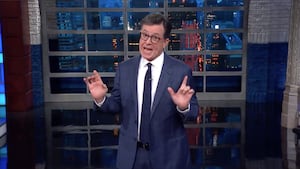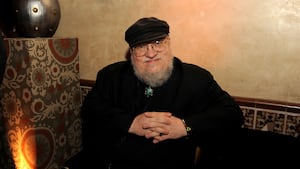When President Trump decided to prematurely celebrate the findings of the Mueller report last month (which he and his supporters deemed a “total exoneration”) on his favorite social media platform, he used a Game of Thrones meme:
It’s unclear if our philistine president watches the show, and if he did, whether he’d even understand it. Presumably members of his staff are fans of the HBO series and have encouraged the president (or taken it upon themselves) to routinely tweet resolute or constipated-looking photos, depending on your point of view, captioned in the signature GoT font without a hint of irony.
The president’s embrace of the show, which has drawn more attention (and subsequently more hate-watchers) as it approaches its highly-anticipated finale, should perhaps not be a surprise. After all, Trump has an established penchant for trying to pounce on topics popular in the public imagination.
But lately the right has appeared to be more on board with the show recently after earlier reports of resistance—perhaps owing to the infamous George W. Bush’s-head-on-a-stake incident. Back in 2016, polling suggested that GoT was an exclusively blue state phenomenon.
The show has consistently critiqued the corruption of wealth (Elizabeth Warren is an unabashed fan), its viewership skews younger (just like the Democratic Party), and even the series’ architect—author George R.R. Martin—has explicitly said that the plot could be interpreted as an allegory about man’s failure to tackle climate change.
So why have the president and his minions tried to co-opt it? A case could be made that Game of Thrones is one of the few things (outside of pro sports) that has a truly broad-based and arguably bipartisan appeal.
It’s one of the only franchises that is watched collectively enough to provide endless water cooler conversation and social media saturation. The days of the M*A*S*H finale are long gone—there are no regular series earning an audience in the hundreds of millions—but last week’s episode attracted its highest ratings ever with 18.4 million viewers, qualifying it as a blockbuster in today’s overstuffed and hyper-siloed media landscape.
And despite the show’s glaring lack of diversity, Black Twitter has routinely had the sharpest and funniest takes on its narrative bombshells.
As the show has grown more popular, like every four-quadrant franchise including Star Wars and the Marvel universe, it has been attacked from all sides.
In recent weeks there have been quibbles that its female leads have either too much agency (the derisive ‘Mary Sue’ taunt has been hurled at the heroic Arya) or not enough (Daenarys’ descent into madness just had to be about a boy, didn’t it?). And yet even those who are fed up with the show, or claim they are, will likely want to see how it all ends next week.
Although the show is likely to end in yet another one of its signature elaborate battle sequences, it’ll be the political machinations and intrigue that should be Game of Thrones’ most enduring legacy.

Not unlike the early, addictive episodes of House of Cards, David Benioff and D.B. Weiss’s show presented the kind of backroom backstabbing and strategizing that many Americans either presume takes place in real-life politics or maybe secretly hope that they do.
Now that the show has long ago eschewed Martin’s text and ventured off on of its own, it has become more polarizing and also more of a blank slate for any partisan to pick and choose what appeals to them and either disregard or denigrate the rest.
Some have argued that Trump’s GoT nods—which have drawn the ire of HBO—may just be another tool with which to “troll the libs.” The thinking goes that he is casting himself as the badass villain in the culture wars of his own making.
As Adi Robertson put it in a column for The Verge last year: “Like a lot of Trump messaging, the Game of Thrones tweet boils down to I’m going to hurt somebody. Isn’t that cool?”
Meanwhile, CNN is weighing in on which characters each 2020 Democratic candidates most resemble and Martin’s early endorsement last week of former Vice President Joe Biden’s candidacy is considered, if nothing else, a highly coveted imprimatur of cool.
Martin, who called Trump a ‘blot” on the White House, called Biden “someone who can beat Trump, and someone who would actually be a good/great president.”
When the show his books inspired comes to an end next week it could mark what Vulture writer Matt Zoller Seitz has called “the era of television as an epic, communal journey.” Awards shows like the Oscars have become more niche programming year after year, and even the Super Bowl doesn’t have the luster it once did, its rating hitting an 11-year-low this past February.
There will be plenty of other buzzworthy shows seeking to fill the GoT void, but more likely it will be supplanted by the real-life political infighting of the 2020 election, which will begin in earnest when the first Democratic debates take place next month.
With its own sprawling cast of characters, the 2020 race will likely require the same amount of patience and investment that GoT did, and it promises to be as entertaining and maddening as the show, too.
The question lingering on GoT also hovers over the upcoming presidential election as well: who will take the throne? And will the “best” man or woman earn that ultimate prize. Of course, despite all the fan hype, the conclusion of GoT has little consequence whereas the choice next November could determine not just whether winter is coming but if it’s here to stay.



